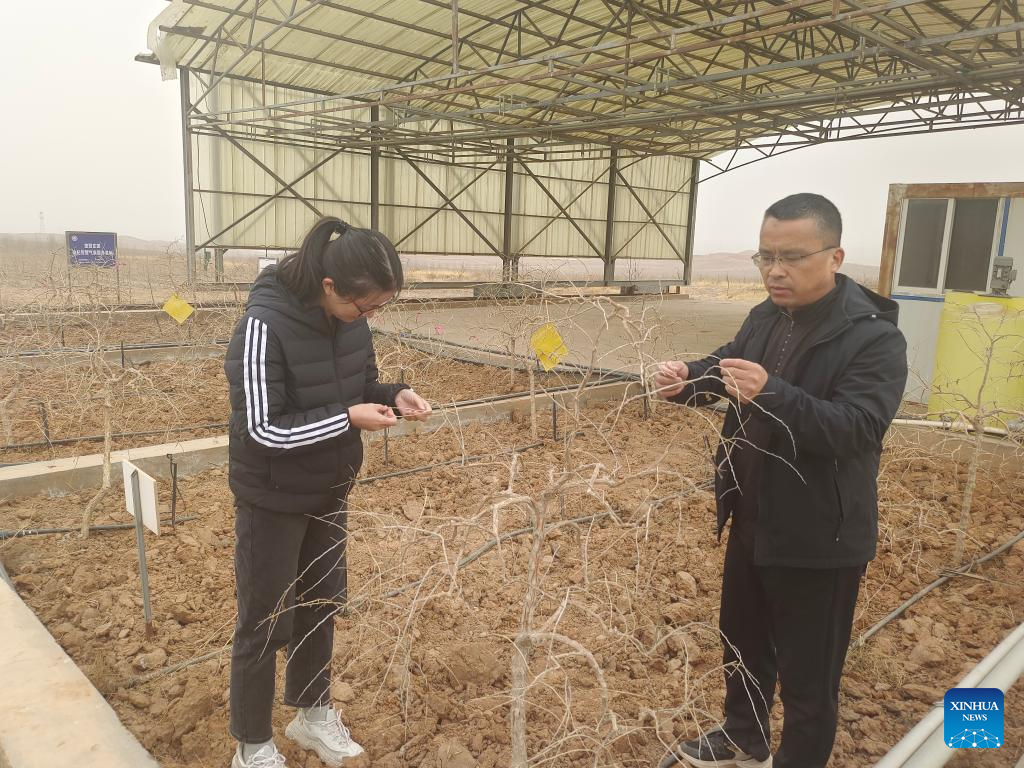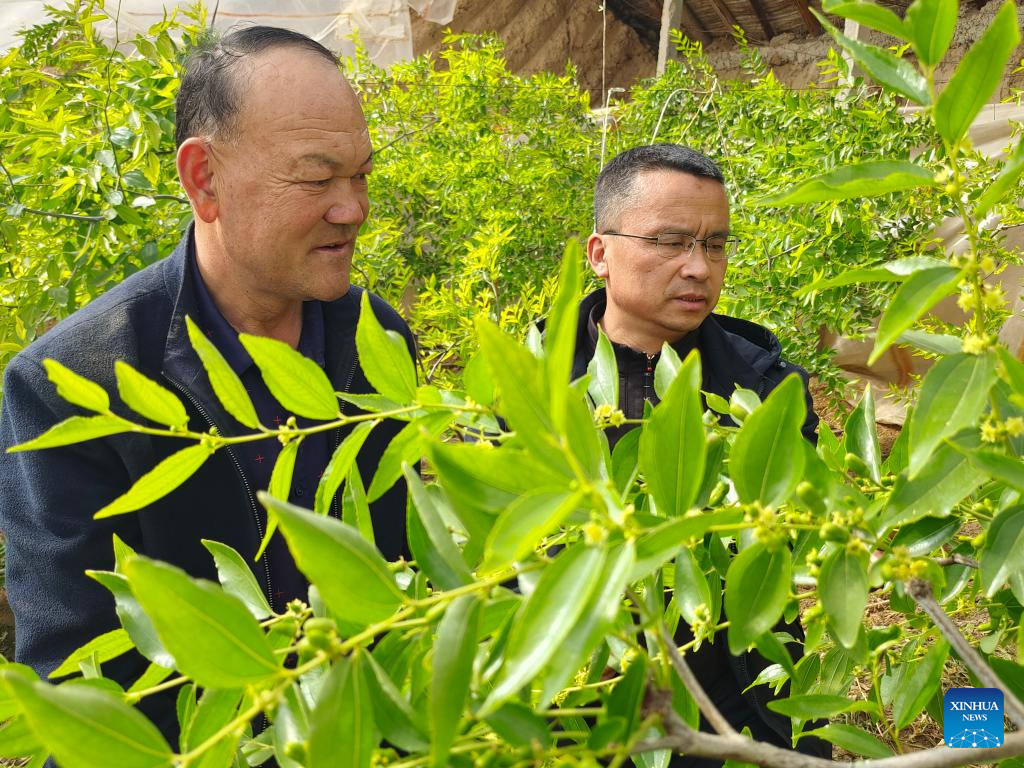
Zhang Lei (R), an expert at the meteorological research institute under the regional weather bureau, checks on goji plants growth with a colleague at the weather service base in Xizan goji berry plantation in Zhongning County, northwest China's Ningxia Hui Autonomous Region, March 22, 2023. (Xinhua/Xie Jianwen)
YINCHUAN, April 2 (Xinhua) -- On the vast Xizan goji berry plantation in Zhongning County, northwest China's Ningxia Hui Autonomous Region, the goji plants start to sprout as the spring breeze blows, guarded by a well-constructed weather service base.
"Some budding signs can be observed now, though not obvious. It will sprout strikingly and turn green in about two weeks," said Zhang Lei, an expert at the meteorological research institute under the regional weather bureau.
As of 2022, the planting area of goji plants in Ningxia has reached 380,000 mu (25,333 hectares). Ningxia aims to double the planting area and achieve an overall industry value of 50 billion yuan (about 7.3 billion U.S. dollars) by the end of 2025.
The unique weather conditions of the dry climate, abundant sunshine, and significant temperature difference between day and night guarantee the goji berry quality and make Ningxia a core area for goji planting. However, such agro-meteorological hazards as frost, drought, heat stress, and occasional rainstorm pose threats to the high-quality development of the local goji industry.
Facing the adverse factors, Ningxia established a weather service center for the goji industry and laid out an effective disaster prevention and relief network composed of many micro weather stations in farmlands, real-time monitoring systems, and field test bases.
The weather service base in Xizan goji berry plantation is a good example. The base is equipped with rain shelters, an artificial rainfall system, and fertigation equipment, where Zhang Lei and his team can monitor the growing conditions of goji plants in different stages.
"We need to watch for frost in spring to protect goji buds while monitoring the rainfall in summer to better forecast an ideal time for picking goji berries," said Zhang, who noted that untimely picking may cause economic loss as goji berries are delicate and need a lot of human labors.
By optimizing the national goji intelligent service system and agrometeorological data sharing platform, Ningxia can share useful observation data and service with other main producing areas of goji berries in China, such as Gansu, Qinghai, and Inner Mongolia.
"We will alert plantations to potential bad weather timely in WeChat groups and advise on production and pest control," said Zhang's colleague Jiang Linlin.
This January, an action plan was jointly issued by the China Meteorological Administration and the China's Ministry of Agriculture and Rural Affairs, which mentions that efforts should be made to boost the high-quality development of agriculture through refined meteorological services.
"Weather means everything to agriculture, while precise and timely risk forewarning of agro-meteorological hazards is playing an increasingly important role in ensuring food security," Zhang said.
Apart from goji berry, the long jujube in Ningxia's Lingwu City is also a regional specialty. Thanks to the weather service, hundreds of jujube trees in the greenhouses of Daquan tree farm in Lingwu have borne fruits already, while the jujube trees planted in the open field have not even sprouted.
These long jujubes will ripen within one month with advanced tech support, about half a year earlier than those grown in open fields, said Wan Zhongwu, deputy head of the tree farm. According to Wan, it could sell for up to 400 yuan per kilogram last year, generating a good revenue for the farm's over 60 workers.
"We are now exploring to shorten the dormancy of long jujube to achieve three or even five harvests in two years," said Zhang Lei.
The scientific advice from meteorologists and refined management matters a lot to the development of modern agriculture, said Wan, who hopes that one day, fresh jujube can be available all year round. ■

Wan Zhongwu (L), deputy head of the Daquan tree farm, and Zhang Lei, an expert at the meteorological research institute under the regional weather bureau, check on jujube trees growth at Daquan tree farm in Lingwu City, northwest China's Ningxia Hui Autonomous Region, March 22, 2023. (Xinhua/Xie Jianwen)